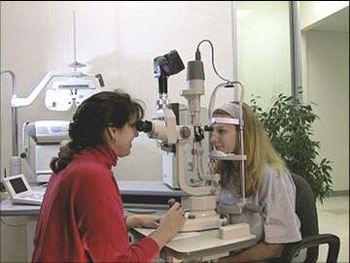A revolutionary software programme that could help reduce the risk of blindness caused by diabetes is a major step closer to the market.
NHS Grampian and The University of Aberdeen's Ophthalmic Imaging Group and image analysis experts Medalytix have joined forces with Scottish Health Innovations Ltd to commercialise the brand new product.
The programme works by rapidly scanning digital photos taken of the eyes of people with diabetes. It hunts for tiny blood spots - microaneurysms - which are the earliest signs of diabetic retinopathy, a leading cause of blindness.
This partnership is timely given that diabetic eye disease remains the leading cause of blindness in the UK working age population. The Scottish Government's Health Department has also instructed NHS Health Boards to implement systematic annual retinopathy screening using digital photography.
Currently retinal screening programmes in Scotland are on track to offer screening to 160,000 people with diabetes in 2008. However, with the number of people with diabetes expected to rise to 350,000 by 2020 and to over two million in England alone, current service capacity will not meet future demand.
Since 1990, the University of Aberdeen and NHS Grampian's Ophthalmic Imaging Group - a multidisciplinary team led by Dr John Olson and Professor Peter Sharp - have worked on a project to automate the analysis of images of the eye's retina for the presence of diabetic eye disease.
The team put their technology to the test in a two-year £200,000 Chief Scientist Office funded project – the largest ever study of its type undertaken - which involved the scrutiny of retinal images of over 6,700 people with diabetes.
Results have shown that software developed by the team is safe, effective and could potentially save NHS Scotland up to £0.5 million per year plus the cost to implement this of up to £0.25 million.
Dr Olson, Consultant Ophthalmic Physician at NHS Grampian, who was the inaugural Lead Clinician of Scotland's Diabetic Retinopathy Screening Programme (2003-2006) said: "The development of validated automated diabetic retinopathy screening software is a major step forward in the struggle to reduce the risk of visual impairment resulting from a worldwide epidemic of diabetes."
Professor Peter Sharp, Chair of Medical Physics at the University of Aberdeen, said: This is yet another example of collaborative work between the University of Aberdeen and NHS and, thanks to our collaboration with Medalytix and SHIL, the product of our research now has the chance of benefiting health services throughout the world.
Scottish Health Innovations Limited (SHIL), the not-for-profit company formed with the sole aim of developing ideas emanating from NHS Scotland employees, has licensed the software from NHS Grampian and the University of Aberdeen.
SHIL has entered an agreement with Medalytix Limited, with the company providing key support to complete development of the software to a fully functional product.
Medalytix will take the product and service to market, and as part of the licence agreement will return a share of the sales to SHIL, NHS Grampian and the University of Aberdeen. Additionally the NHS will benefit from having a system capable of assisting with and facilitating the implementation of the government target of screening everyone with diabetes for diabetic retinopathy.
Dr Nigel McLean, Business Development Manager with SHIL, added: "It represents a significant beneficial deal for NHS Scotland together with SHIL, its partners and Medalytix. Furthermore, this emphasises how a multi-discipline approach, combining the skills of clinicians, computer programmers, and the commercial sector, can work efficiently to produce technologies with the potential to greatly benefit the NHS and patients."
Dr Joanne Phoenix, Business Development Director with Medalytix said: "We are delighted to be working with the pioneering team in Aberdeen and are looking forward to bringing this important development to the market. The cost savings that can be delivered through effective screening for diabetic blindness are well-recognised and automation is widely regarded as a way forward in allowing healthcare systems to address a burgeoning diabetic population in an effective and safe way."
Medalytix will also fund and work with the team on a two-year project, to further develop a second piece of software currently being developed with the aid of a CSO grant. The end product is expected screening for additional risk factors of blindness.
The project has received critical acclaim – winning the Royal College of Ophthalmologists' Foulds Trophy for best research presentation in 2005 and, similarly, the Diabetes UK Young Diabetologist Travel Award in 2006.
The ongoing work was highlighted in Scotland's Chief Scientist Office's 2006 Annual Report, and the clinical results and cost-effective analysis has been published in two papers by the British Journal of Ophthalmology.


